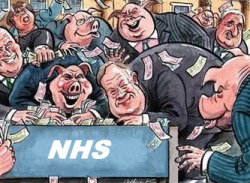 It is said British general practice is a broad church, and indeed it is. No branch of medicine collects under its wing such a panoply of talent and motivation. While most GPs sit somewhere near the centre, the tails of the bell shaped curve contain a diverse collection of crackpots, duds and no-hopers at one end; and at the other a rare collection of the exceptional – the exceptionally talented, the exceptionally compassionate – and the exceptionally greedy.
It is said British general practice is a broad church, and indeed it is. No branch of medicine collects under its wing such a panoply of talent and motivation. While most GPs sit somewhere near the centre, the tails of the bell shaped curve contain a diverse collection of crackpots, duds and no-hopers at one end; and at the other a rare collection of the exceptional – the exceptionally talented, the exceptionally compassionate – and the exceptionally greedy.
Despite the fact that general practitioners are adequately remunerated (we will leave the remuneration bun-fight for another day) for the work they do, a percentage – Dr No estimates perhaps fifteen to twenty percent – want more. Some of these individuals have an over-inflated opinion of their value to society, and consider that value should be reflected in their bank balance. And others – lets not beat about the bush here – are just plain greedy. Their primary purpose in practising medicine is to make money – lots of money.
We have already seen how some GPs have set up limited companies, run surgeries staffed by salaried GPs, and hoovered up handsome profits in the process. Such GPs may be no better or worse clinically than their less avaricious colleagues, but the fact that they choose the practice model that they do – which puts money at the heart of what they do – tells us something about where priorities may lie for these doctors.
And these are the doctors who will take to commissioning just as Dracula might take to a virgin, for the simple reason that the Con-Dem’s proposals for the NHS offers very rich pickings for those so inclined; opportunities to suck vast profits from the NHS budget.
Channel 4 News reported earlier this week on an outfit called IHP – Integrated Health Partners. This benign sounding private limited company declares itself to be a ‘managed care organisation’, or MCO. MCOs are organisations that:
“reduce unnecessary health care costs through a variety of mechanisms, including: economic incentives for physicians and patients to select less costly forms of care; programs for reviewing the medical necessity of specific services; increased beneficiary cost sharing; controls on inpatient admissions and lengths of stay; the establishment of cost-sharing incentives for outpatient surgery; selective contracting with health care providers; and the intensive management of high-cost health care cases.”
In short, on the face of it, IHP is an American style healthcare stitch-up that controls both doctors and the care they provide to patients in the interests of saving money. And saving money – ‘achieving underspend’ – is indeed at the core of IHP’s vision:
“Vision: Our ICOs [integrated care organisations]would be [now are] organisations owned by participating GP practices and IHP, set up to manage the care budget and achieving underspend by better coordinating care and aligning incentives amongst all providers.”
And the purpose of ‘achieving underspend’? A noble attempt to help the NHS save money? Not a bit of it – instead, the ‘underspend’, estimated at £40 per patient, will go towards boosting company – and so GPs’ profits.
Lining one’s private pocket from the public purse at a time of stringent public sector cuts is itself a few notes taller than rich: what makes the Con-Dem’s proposals that will allow this to happen even more extraordinary – some might even say obscene – is mechanism by which this will happen.
Under ‘any willing provider’, GP consortia will be allowed to set up separate provider limited companies that will compete with – and be allowed to undercut – NHS providers to provide healthcare. Indeed, the Royal College of General Practitioners saw this coming, and has helpfully provided guidance and a toolkit, commended by the College Postman, – on how to set up Primary Care Federations that combine commissioning arms with private company provider arms that can exploit – to quote the toolkit – ‘possibilities in terms of the provider agenda’. Amongst the examples given is this ‘best mix of family doctor services and private resources’.
Thus brother GP commissioner will contract with brother GP provider, all very cosy in the happy family of general practice. To be fair, there are some token nods in the direction of managing conflicts of interest, but Dr No can’t help wondering whether, when push comes to shove, when the lights are low, and a nod is as good as a wink, the brothers will come together, and, like it or not, it will be jobs for the boys.
